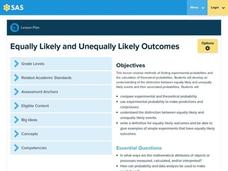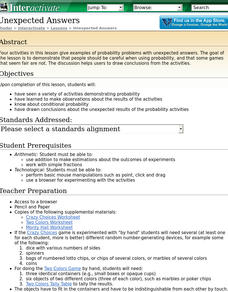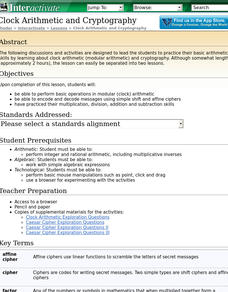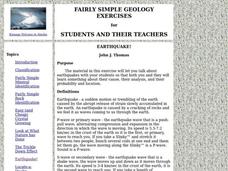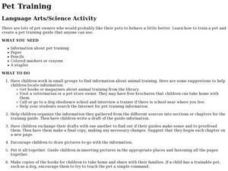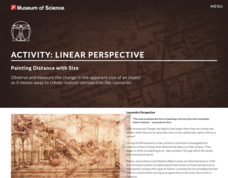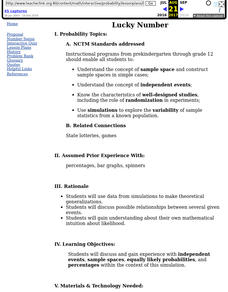Curated OER
Simple Everyday Products
Fourth graders investigate the origin of products and how they are manufactured from natural resources. They draw the production cycle and discuss how one could help reduce the number of natural resources that are used. They also...
Pennsylvania Department of Education
Equally Likely and Unequally Likely Outcomes
Students explore probability. In this statistics/probability lesson, students compare experimental and theoretical probability and use experimental probability to make predictions and conjectures. Students explore the distinction...
Curated OER
Unexpected Answers
Students consider probability problems with unexpected and surprising answers.
Curated OER
What are the Odds
Students predict the-outcome of an event. In this algebra lesson, students compare and contrast the probability of an event occurring. They calculate the odds of a simple event and make estimation.
Curated OER
Clock Arithmetic and Cryptography
Learners investigate modular clock arithmetic and cryptography. They perform basic operations in modular (clock) arithmetic and encode and decode messages using simple shift and affine ciphers.
Curated OER
Earthquake!
Learners study causes, probability and location of earthquakes. They complete a number of activities and look at web pages to examine the characteristics of earthquakes.
Curated OER
Mirror Writing
In this mirror writing instructional activity, students follow the directions to decide which alphabet letters are symmetrical. Students use a mirror and a white light as they work in partners to trace simple shapes.
Curated OER
The Why and How of General Terms
Sixth graders find the recurrence relation for simple sequences
construct tables of values for a pattern. They find the value of the general term of a sequence algebraically.
Curated OER
Homemade Bubble Makers
Students make a simple bubble maker using two straws and string. In this art lesson, students make another bubble maker by bending a coathanger into a loop. Students enjoy making bubbles.
Curated OER
Pet Training
There are lots of pet owners who would probably like their pets to behave a little better. In this activity, students will learn how to train a pet and create a pet training guide that anyone can use.
Curated OER
The Tree of Life
Students discover the amount of diversity that exists in a local area using simple techniques that make observing biodiversity easy and enjoyable. They select a tree to study, collect vials of specimens, then identify the arthropod.
Curated OER
Describe and Interpret Images: Folded Strata
Pupils describe and interpret images. They make a simple sketch of an outcrop shown in a slide (or computer projection) then discuss possible interpretations.
Curated OER
Parachutes: What Affects a Parachute
Students create a simple paper parachute. For this parachute design lesson, students examine the effects of the wind and make napkin parachutes.
Curated OER
ESL-Future Tense
For this ESL future tense worksheet, students change verbs shown in brackets in sentences to both the "going to future" and present continuous form, and put verbs in simple future tense.
Museum of Science
Linear Perspective: Painting Distance with Size
Young scholars examine a simple set up to measure the change in the apparent size of an object as it moves away from them.
Curated OER
Thinking!!!
In this mathematical concepts worksheet, students complete math word problems dealing with fractions, multiplication, probability, and more. Students complete 8 problems total.
TV411
Whip up a Storm of Writing Ideas
Need a key to unlock writer's block? Introduce your writers to four easy steps that will release them from their mental prison. The brainstorming worksheet, designed to set free their imaginations, even has an answer key.
Curated OER
Working with Frequency Tables
In this Working with Frequency Tables worksheet, learners analyze data that is organized in simple frequency charts. They calculate average from data presented in a frequency table, calculate a cumulative score, and identify data that...
Curated OER
Lucky Number
Students use data from simulations to make theoretical generalizations. They discuss possible relationships between several given events and gain understanding about their own mathematical intuition about likelihood.
Curated OER
Insect Classification
Learners compare and contrast the visible structures of three insects based on photographs. They differentiate characteristics of crane flies, ants, and wasps then create a simple classification system.
Curated OER
Music
Third graders sing the Shaker tune "Simple Gifts" while identifying eighth, quarter, and half notes. They listen to Aaron Copland's Appalachian Spring and recall other ballet music.
Curated OER
A Statistical Study on the Letters of the Alphabet
Students see that there are mathematical rules that can affect our use of the English language. Calculate the probability of picking any letter at random from a piece of English literature.
Curated OER
SNACK TIME
Learners explore writing sequential information by composing the simple recipe of peanut buttera and jelly sandwiches.
Curated OER
Natural Selection
Students practice calculating allele and genotype frequencies in the framework of a simple simulation using hard candy, calculators, and a worksheet. This lesson includes a three-page worksheet and an assessment question for conclusion.
Other popular searches
- Probability of Simple Events
- Simple Probability Patriotic
- Simple Probability Math
- Probability Simple Events



